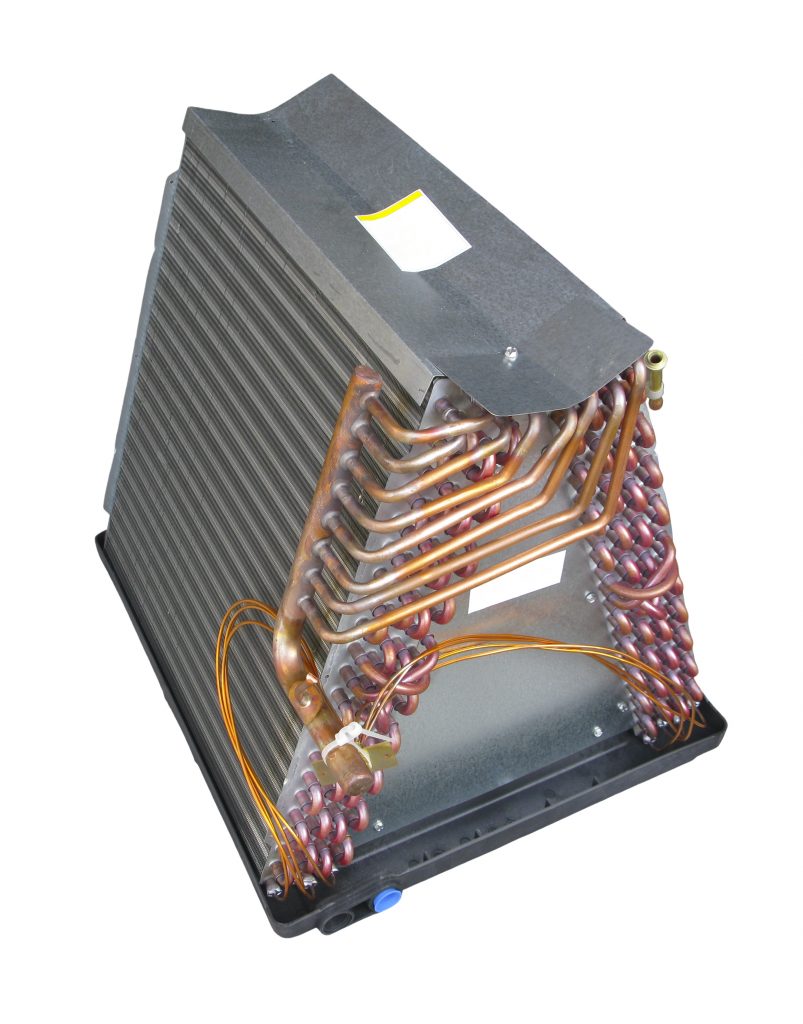Your home’s cooling system contains something called an evaporator coil. This section of the appliance helps circulate refrigerant, cooling air that’s blown across the coils to regulate temperatures inside your home.
Like any aspect of any piece of equipment, an evaporator coil is capable of breaking down. Knowing how to tell if the evaporator coil is leaking is beneficial as a homeowner.
If you find your evaporator coil leaking refrigerant, it helps to know what to do.
An experienced HVAC technician can repair the issue and get your AC unit working properly again, but as a homeowner, you need to recognize the signs of leaking evaporator coil so you know to call your technician in the first place.
Signs of a Leaking Evaporator Coil
You can’t do anything to fix an evaporator coil leak if you don’t understand how to notice your evaporator coil leaking refrigerant.
Here are four signs of a leaking evaporator coil so you can address the issue and get it repaired quickly.
1. Water Overflowing Drip Pan
Your AC unit has a drip pan to collect normal condensation build-up.
As your unit operates, the evaporator coils can develop condensation and trip into the pan from normal frost build-up. However, if your drip pan is full to the point of overflowing, there is some issue with your unit. It could be an evaporator coil leak.
2. AC Takes a Long Time to Cool Home
If there is not enough refrigerant in your AC system, then your unit has to work even harder to properly cool your home.
Without a satisfactory amount of refrigerant, your air conditioner may not be able to cool your home well at all, leading to you may have a warm, sticky, and uncomfortable home temperature.
If you notice that your AC is taking a long time to cool your house, then you may have a refrigerant leak.
3. Weak, Unresponsive Airflow
Your cooling system should respond to thermostat changes.
If you turn on your AC or lower the thermostat temperature, you should hear your AC kick on and blow cool, constant air until the temperature in your home meets your settings.
If the airflow feels weak or if the AC unit doesn’t turn on immediately to a thermostat change, you could have a refrigerant leak.
4. Warm Airflow
As mentioned above, if your air conditioner doesn’t have enough refrigerant, then it can’t properly cool your home.
Your AC may still blow air fine, but without enough refrigerant, that air could be warm. If you feel warm air blowing through your vents even though your temperature is set to a cool temperature, you could have a refrigerant leak.
Other Signs of Leaking Evaporator Coil
Other common signs indicating you could have leaking evaporator coils are hissing noises coming from your exterior unit, frozen evaporator coils, odors coming from your HVAC unit, or pools of liquid around your unit.
Keep in mind that many of the signs indicating an evaporator coil leak could also be indicating a separate issue. Ignoring these issues could lead to more severe damage.
Be sure to call your HVAC technician to repair it when you notice it.
How an Evaporator Coil Leak Happens
Chemical Reactions
Chemical reactions between high humidity levels, volatile organic compounds (VOCs), and the copper piping of your evaporator coils can end up causing a leak.
These materials mix to create a chemical reaction that damages the coils. VOCs may be normal gases created in the average household or they can come from cleaning products, cosmetics products, air fresheners, paint, or even construction materials.
When mixed in with moisture in the air and the copper coils, a damaging reaction can occur.
Copper Pipe Erosion
As your unit operates, the copper tubing in the evaporator coils can begin to corrode.
As the corrosion occurs, small holes develop in the evaporator coils, leading to small leaks that are hard for homeowners to detect. After a while, all of your refrigerants can end up leaking out and causing your AC unit to operate poorly.
Normal Wear and Tear
While you want your AC unit to be the best of the best, the truth is that no air conditioner is immune to breaking down.
Time and use cause normal wear and tear throughout the years, sometimes leading to an evaporator coil leaking refrigerant.
Knowing the signs of leaking evaporator coil and how to find a leak in evaporator coil are the best defenses you have against this problem since you can catch the issue early on and prevent extra damage from occurring.
How to Fix an Evaporator Coil Leak
If you are suspicious of an evaporator coil leak in your home, your best course of action is to call in an HVAC professional you can trust.
John C. Flood will assign a licensed technician to your job and have them inspect the issue immediately. There are many tests a technician can run on your unit to diagnose the issue and confirm if an evaporator coil is an issue.
As mentioned, several of the signs indicating you have an evaporator coil leak are also indicators of other issues. A skilled technician will investigate to determine if your leak suspicion is correct or if there is another problem at hand.
If an evaporator coil leak is an issue, then the coils will need to be repaired or replaced. Adding more refrigerant to your evaporator coils will not resolve the issue. In many cases, sealing the holes is an ineffective way of resolving the issue as well.
The seals can be ineffective, wear away over time, or cause higher electric bills. In most cases, an evaporator coil replacement — while pricey — is your best option.
Preventing evaporator coil leaks is the best, most affordable option for a homeowner.
Regular professional maintenance keeps your HVAC unit in good condition, helping prevent damages and breakdowns like leaking evaporator coils.
The best thing you can do yourself as a homeowner is to change your filters every month or two to allow air to move freely and cleanly. The buildup of dust and dirt from rarely changed filters can lead to an evaporator coil leak developing before its time.
Preventative Maintenance Plans
John C. Flood offers preventative maintenance plans to help keep your AC in better working order. Getting your unit tuned up and cleaned regularly can help avoid unnecessary breakdowns and leaks.
A lot of evaporator coil leaks occur because a unit wasn’t properly maintained or nobody noticed the signs of wear before they became severe. Regular preventative maintenance can save you money in the long run by keeping your unit in good working order.
Schedule a Service Appointment for Your Evaporator Coil
Now you know how to find a leak in the evaporator coil, so if you suspect you have a leaking evaporator coil, don’t hesitate to contact John C. Flood and schedule a service appointment.
Ignoring the problem can lead to larger, more severe issues developing. Our reliable team of experts strives to give our customers trustworthy, valuable, and efficient service.
We can help resolve your leaking evaporator coil in no time.
Whether you require installation, repair, or maintenance, our technicians will assist you with top-quality service at any time of the day or night. Take comfort in knowing your indoor air quality is the best it can be with MOE heating & cooling services Ontario's solution for heating, air conditioning, and ventilation that’s cooler than the rest.
Contact us to schedule a visit. Our qualified team of technicians, are always ready to help you and guide you for heating and cooling issues. Weather you want to replace an old furnace or install a brand new air conditioner, we are here to help you. Our main office is at Kitchener but we can service most of Ontario's cities
Source link




Add Comment